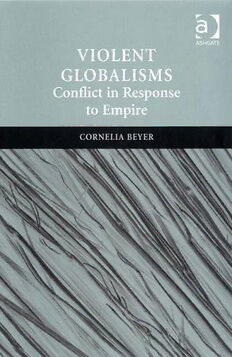
Violent Globalisms PDF
159 Pages·2008·1.549 MB·English
Most books are stored in the elastic cloud where traffic is expensive. For this reason, we have a limit on daily download.
Preview Violent Globalisms
Description:
Beyer provides a structural explanation for the 'Global War on Terror' in terms of its broader context and causes. During the post-cold war unipolar world, the only superpower encounters an unprecedented challenge: a non-state enemy that is challenging its hegemony and uses violence as a strategic means. Given the international nature of this phenomenon, such a structural explanation requires an added necessity and urgency. This structural approach can provide for both a proper understanding of the phenomenon of international terrorism and for formulating effective policies to counter it.Current studies of transnational terrorism and the interrelated role of hegemonic power are undertheorized. This book remedies this theoretical neglect and in doing so opens up new modes of thinking about and struggling against global terrorism.
See more
The list of books you might like
Most books are stored in the elastic cloud where traffic is expensive. For this reason, we have a limit on daily download.
